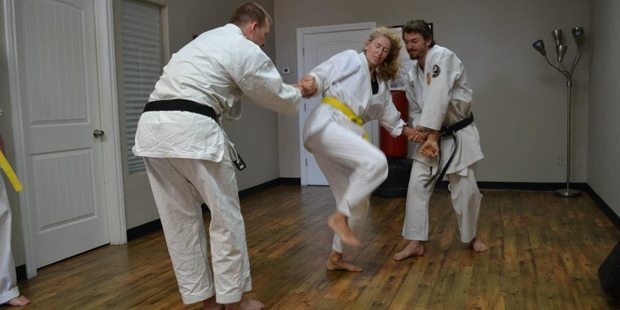Sign language interpreters can expect to get a good workout when a Scottsdale dojo expands its assistance in martial arts practices and workout classes to deaf students.
Peaceful Warrior Martial Arts & Healing Center is introducing interpreters to deaf students in
women’s self defense, starting Oct. 18, and Yin Yoga starting Sept. 8, to give better instruction and help the students become more successful in their craft.
Richard Poage and Tiffany Richards, owners of Peaceful Warrior Martial Arts and Healing Center, were prompted to host a women’s self-defense class with an interpreter by a deaf student, Missy Keast.
“Missy has always wanted to do karate and found it challenging with the communication gap,” said Richards. “Her three children and husband are all hearing. When she walked in to our dojo for the first time, she was writing things down for Richard, our head instructor/sensei. When he realized she was deaf, he called me in the room and I started signing to her.”
Richards took three semesters of sign language in the late ‘90s, she said.
“It was a relief to the women who did come to the Yin Yoga series. Missy was the one that said, ‘Hey, you guys need to be doing this class. Come down to my karate school and do this yoga class,’” Richards said. “There was going to be an interpreter there, so that was a relief for them and then they all came in.”
The six-week Yin Yoga series had an interpreter and was attended by six women from the deaf community.
“One of the students asked if we ever hosted women’s self defense seminars for the deaf community, which then prompted us to add an interpreter for our next seminar in October,” said Richards.
Keast is a deaf student who takes Kobudo (a self-defense class), a fundamentals class, and a family class with her three daughters at Peaceful Warrior. Keast has been a member for about three years and is seen as a mentor in the classes and deaf community.
“My personal issues are my personal issues. That’s how I make my choices. I don’t want to bring an interpreter with me each time,” Keast said. “Our relationship is between myself and the instructor. The instructor demonstrates a great deal and I follow that. I have a book and we share that and we go around one-on-one [in the class].”
Keast explained that having an interpreter in a class is a luxury and the class would run and improve 200 percent for the deaf students. She feels very comfortable interacting with deaf and hearing people, but other deaf people might feel more comfortable having an interpreter in the class.
“With the interpreter there in the class, there is such a benefit. It’s not only for deaf people, but for other people as well, because they will be able to see a different language and their attitudes might change,” Keast said.
Jean Brennan has been a freelance American Sign Language interpreter for 24 years and will be interpreting for the women’s self defense and yoga classes at Peaceful Warrior. Brennan’s role is to assist to make the information in the classes “as clear, understandable and useful as possible” to the deaf students.
“It provides instruction in a deaf person’s native language. Whenever you do that, it broadens the whole ability to understand and participate in what’s going on,” Brennan said.
Brennan said having an interpreter and deaf students in the classroom will make hearing people more open to communicating with deaf people and to possibly learn a new language.
“When hearing people are around deaf people in this type of a situation, it’s a real eye opener for them. Many hearing people have never associated with deaf people and they have no idea what straight up and down deaf people are; they are exactly what they are just with a different mode of communication,” Brennan said.
Deaf students tend to be more shy and stay at home when they are afraid, Keast said. She urges everyone to go to the classes because “the world is a big place and you don’t want to miss out.”
“There will probably become a time when people function like Missy does. Once you reach a level of comfort, once you know the people, once you have a sense of what it’s all about, then it is easier to move in and out of classes that perhaps don’t have an interpreter,” Brennan said. “In the initial stages, it is very important that you feel like you know what your doing.”
Peaceful Warrior’s value system is to create community, bring families together and develop character by participating in the classes and workshops available. Bringing an interpreter into a few classes is just the beginning, said Richards.
“I would love to be able to bring in an interpreter if we had more deaf people coming to the Karate studio, which I absolutely believe in and I believe that we should,” Richards said. “We reach out to the community and we look at what our community needs and we try to service those needs.”




